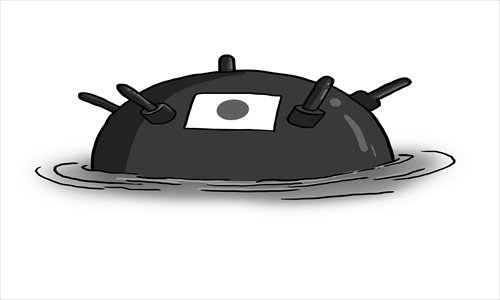Ocean-lapped Japan wary of China's continental power

Japan's foreign policy has seen some adjustments recently. Japan is stressing the importance of its alliance with the US, both regionally and globally.
As a result, Japan has taken a hard-line on the Diaoyu Islands. It also raised the issue of boosting military capabilities in the southwest island chains in its latest Defense White Paper, which considered China to be Japan's biggest security threat. Japan has also pushed forward military cooperation agreements with the Philippines and South Korea, though the process has encountered some setbacks.
These national strategic adjustments are linked to Japan's status as an oceanic nation, surrounded by the sea. Scholars of geopolitics have raised the idea that oceanic countries and continental countries naturally tend to confront each other.
The core of the idea is that oceanic countries form alliances to counter the threat of the greater land strength of continental countries by controlling the "rimland," the maritime fringe of a continent.
The sense of sea power, though challenged by the concepts of Greater East Asia and East Asian Cooperation after World War II, still plays an influential role in Japan.
In Japan's eyes, China, a continental country, will threaten the security of oceanic countries. Since the Democratic Party of Japan took office in 2009, it has defined China as "a matter of concern" for Asia and the international community.
Japan has also listed its southwest island chains closest to China as a key point for national defense, shifting its strategy southwestward. The chains include the Diaoyu Islands. That's why Japan has made a fuss in the region recently.
Meanwhile, Japan is trying to get closer to the US. Despite its size, the US is an oceanic country, projecting its power into the world's two great oceans, and there's a common diplomatic idea that oceanic countries should form an alliance to contend with continental countries.
Since World War II, Japan has consistently followed a policy of leaning to the US. It has tried to make the US-Japan alliance more multilateral, forming an Asia-Pacific Community with the US, Australia, New Zealand, India, and ASEAN.
In its 2010 Defense White Paper, there were suggestions to strengthen the US-Japan alliance and deepen the alliance's defense cooperation with South Korea, Australia and India.
Finally, Japan has paid extensive attention to Southeast Asian countries that belong to the rimland. The US geostrategist Nicholas Spykman (1893-1943), who coined the term, once said, "Who controls the rimland rules Eurasia, and who rules Eurasia controls the destinies of the world."
Japan sees the Chinese mainland as the heartland of Eurasia, and believes Japan, Chinese Taiwan, Southeast Asia and India can form the rimland.
Former foreign minister Taro Aso used to raise the concept of an "arc of freedom and prosperity," which has been widely interpreted as an effort to contain China.
Former Japanese prime minister Shinzo Abe raised the notion of a "quadrilateral security dialogue" with the US, Australia and India.
Currently, the Yoshihiko Noda administration is promoting security cooperation with South Korea, the Philippines, Australia and India, and trying to form multilateral frameworks.
Japan's sense of the importance of sea power is the main basis for China to judge the direction of Japan's foreign policies. It provides a theoretical basis for Japan's "leaning to the US" policy.
It also reveals that Japan feels threatened toward China's rise and positively forms a framework with other countries to contain China. But meanwhile, Asia is still within Japan's interests, as the raising of the notion of the East Asian Community shows.
Japan may have to take a side with either the oceans or the continent in the future.
In the short run, the sea power sense may dominate Japan's strategy. In the long run, the competition between the US, a declining oceanic power, and China, a continental country on the rise, will inevitably affect Japan's future strategies.
The author is deputy director of the Department of Japanese Studies at Shanghai Institutes for International Studies. opinion@globaltimes.com.cn